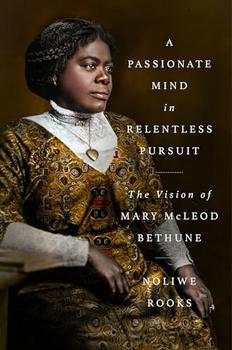Summary | Excerpt | Reviews | Beyond the book | Read-Alikes | Genres & Themes | Author Bio

The Vision of Mary McLeod Bethune
by Noliwe RooksThe life of legendary American educator and Black civil rights activist Mary McLeod Bethune (1875-1955) receives long overdue attention in historian Noliwe Rook's poignantly personal A Passionate Mind in Relentless Pursuit. This is the second entry in Penguin Press's Significations series, curated and edited by Henry Louis Gates, Jr., in which prominent writers and thinkers "reckon with the life, work and significance of a range of essential Black American figures."
Rooks, professor and chair of Africana Studies at Brown University, introduces readers to Bethune, a woman whose many firsts are "a song of Black survival and safety": in her family, Bethune was the fifteenth of seventeen children and the first to be born free; she was the first woman to establish a historically Black college for girls; and she was the first Black woman to head a U.S. federal division (the Division of Negro Affairs). For Rooks, the historical impact of Mary McLeod Bethune hits remarkably close to home: her grandparents attended Bethune-Cookman University in Daytona, Florida, and her grandfather knew Bethune through his work with the National Association for the Advancement of Colored People (NAACP) in the 1940s.
In this slim volume, Rooks spotlights Bethune's lifelong commitment to Black higher education, which began when she created her own all-girls Black school in Daytona in 1904. She considers Bethune's emphasis on the twin pillars of "the ballot and the book" to achieve a more inclusive democracy but notes how her vision broadened over time to one "where Black women's issues and needs were not confined to specific regions or countries but had national and international resonance." And while Bethune championed education, equality, and justice for Black people in general, she was particularly committed to elevating Black women, as Rook observes: "Bethune dreamed of a world where Black women and girls basked in the warmth of their collective suns."
Acknowledging the better-known portions of Bethune's impressive resume—her prominent civil rights work with President Franklin D. Roosevelt's administration and close friendship with Eleanor—Rooks's research pays off the most with an unexpected examination of Bethune's capitalistic ventures that highlights how "as a race woman, [she] also believed in Black businesses and in keeping Black dollars circulating in Black communities." Indeed, Bethune's financial investment in two stretches of Florida beaches created exclusively for Black people—American and Bethune Beach—was an act of belief in Black solidarity; as such, the beaches were "two places that fit together pieces of a puzzle about Black wealth, peace, safety, and survival." Rooks is quite good at tying historical strands to her own lived experiences. She describes her near-drowning as a child at that same American Beach when a rip tide pulled her out—a harrowing memory made more frightening when she grasps the true horrors of those waters as an adult:
"That form of Black death began during the slave trade when the captains of such ships hurled their still living cargo overboard to escape prosecution for engaging in the outlawed trafficking of human beings. For those so murdered, only a small number of their limp, bloated, soulless bodies ever touched land again. Those that did floated up right where I had stumbled out of the sea."
A Passionate Mind in Relentless Pursuit is not a full-length biography of Bethune, though it may make the reader want to seek one out. Rather, it is an active conversation between writer, subject, and reader—an egalitarian exchange of ideas between the past and the present, the personal and the political.
![]() This review
first ran in the August 21, 2024
issue of BookBrowse Recommends.
This review
first ran in the August 21, 2024
issue of BookBrowse Recommends.

If you liked A Passionate Mind in Relentless Pursuit, try these:

by Scott Shane
Published 2024
A riveting account of the extraordinary abolitionist, liberator, and writer Thomas Smallwood, who bought his own freedom, led hundreds out of slavery, and named the underground railroad, from Pulitzer Prize-winning author and journalist, Scott Shane. Flee North tells the story for the first time of an American hero all but lost to history.

by Kellie Carter Jackson
Published 2024
A radical reframing of the past and present of Black resistance—both nonviolent and violent—to white supremacy.
Music is the pleasure the human mind experiences from counting without being aware that it is counting
Click Here to find out who said this, as well as discovering other famous literary quotes!
Your guide toexceptional books
BookBrowse seeks out and recommends the best in contemporary fiction and nonfiction—books that not only engage and entertain but also deepen our understanding of ourselves and the world around us.